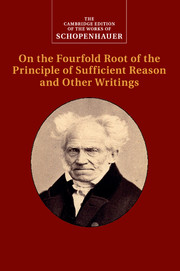Book contents
- Frontmatter
- Contents
- General Editor’s Preface
- Editorial Notes and References
- Introduction
- Notes on Text and Translation
- Chronology
- Bibliography
- Collation of the Two Editions of On the Fourfold Root
- 1 On the Fourfold Root of the Principle of Sufficient Reason
- 2 On Vision and Colours
- 3 On Will in Nature
- Glossary of Names
- Index
Physical Astronomy
Published online by Cambridge University Press: 30 June 2022
- Frontmatter
- Contents
- General Editor’s Preface
- Editorial Notes and References
- Introduction
- Notes on Text and Translation
- Chronology
- Bibliography
- Collation of the Two Editions of On the Fourfold Root
- 1 On the Fourfold Root of the Principle of Sufficient Reason
- 2 On Vision and Colours
- 3 On Will in Nature
- Glossary of Names
- Index
Summary
For no part of my theory was I entitled to have less hope for a corroboration from the empirical sciences than that part which applies to inorganic nature the fundamental truth that Kant's thing in itself is will, and presents what is active in all nature's fundamental forces as simply identical with what we know in ourselves as will. – I have been all the more pleased to see that an extraordinary empiricist, overcome by the power of truth, has come to pronounce this paradoxical proposition in the context of his science. This is Sir John Herschel, in his Treatise on Astronomy, which appeared in 1833 and in 1849 has been published in a second, expanded edition under the title Outlines of Astronomy. As an astronomer who knows gravity not merely from the one-sided and really crude role it plays on earth – but from the more genteel role that devolves on it in the universe, where planets play with one another, betraying attraction, as if flirting, but not going so far as crude groping, and instead maintaining their proper distance as they continue to dance their minuet decorously to the harmony of the spheres – thus in the 7th chapter, where he arrives at the statement of the law of gravity, p. 371 of the first edition, Sir John Herschel declares:
‘All bodies with which we are acquainted, when raised into the air and quietly abandoned, descend to the earth's surface in lines perpendicular to it. They are therefore urged thereto by a force or effort, the direct or indirect result of a consciousness and a will existing somewhere, though beyond our power to trace, which force we term gravity.
As an Englishman who above all is concerned that the Mosaic account (which lies closer to his heart than any insight or truth in the world) not be imperilled, Herschel's reviewer in the Edinburgh Review, October 1833, taking great offence at this passage, correctly notes that apparently here it is not a question of the will of almighty God who has called into being matter with all of its properties, but absolutely does not want to give credence to the statement and denies that it follows from the preceding paragraph, by which Herschel wished to establish it.
Information
- Type
- Chapter
- Information
- Schopenhauer: On the Fourfold Root of the Principle of Sufficient Reason and Other Writings , pp. 389 - 400Publisher: Cambridge University PressPrint publication year: 2012
